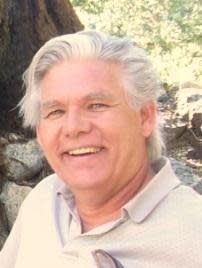Kurt Volbeda: Asking for it
A common problem, when it comes to reasoned debate, even among well-trained scholars, concerns misunderstanding or distorting a particular position of someone being critiqued. Take the example of Kent Fry regarding my recent column about Ottawa Impact.
He “suggests” I hold the following view: "Either support county commissioners aligned with Ottawa Impact or side with tolerance by throwing out a prescientific Bible that is completely wrong [my emphasis, Sentinel, March 14],” Actually, in truth, I have never said the Bible is completely wrong.
More:My View: Don't reduce complex subjects into this or that
More:My Take: The real problem is Ottawa Impact’s battle is hopeless.
Later in his column, Mr. Fry again misattributes to me the view that, “Either we have a prescientific outdated view of life based on the Bible or some sort of modern scientific view of life.”
Whether Mr. Fry intended it or not, his two statements best characterize an atheist. In none of my columns have I ever espoused anything close to atheism. (By the way, I do not dismiss as worthless all atheistic critiques about the idea of God, but cannot go into that here.) Just so, in my last column (March 4), when mentioning Christian religious experiences, I clearly did not resort to either-or reductionist talk. It is beneath principled debate to suggest my approach to resolving problems regarding biblical teachings and scientific discoveries comes down to the simplistic, silly, all-or-nothing, reasoned argumentation of a fifth-grader.
Why is it that Christians who respond to my columns, like Mr. Fry, never address the problem of the fatal flaw in the Bible I keep highlighting? Why has no local Christian scholar responded by arguing, for example, that it makes no theological difference whatsoever whether or not God resides in the sky surrounding Earth, as God does in the Bible? The explanation is clear to me. So I am not surprised Mr. Fry also ignores the problem I keep raising.

For 400 years — four hundred! — the church has successfully disregarded the fatal problem of God not residing anywhere in outer space. However, I am not naïve. Nothing I do will change the situation much. In fact, challenging a person’s religious beliefs generally leads to their views hardening. How dumb not to remain silent about the way in which the Christian church has misled me (to use restrained language for the sake of kindness). It is counterproductive.
Mr. Fry states, “Maybe it is possible to rejoice in God [the creedal God of Christianity] ... and at the same time welcome all that our modern scientists teach us about the universe [my emphasis].” Well, if it is possible, then why do Reformed denominations continue to make belief in literal Adam and Eve a creedal matter? If it is possible, why are professors in Christian colleges dismissed who begin openly questioning belief in literal Adam and Eve? It is all understandable. The horrific alternative, liberalization, is obviously not acceptable, because that means the death of the Christian church as it has been known for 1,500 years.
For an audience fully informed by scientific discoveries (free of the unspoken, deceptive, physicalist presuppositions that in themselves have no scientific grounding whatsoever), a literal reading of the text turns it into fifth-grade nonsense. Only reading the text in terms of mythological symbolism both rescues it from baloney and brings out its profound, wise meaning still applicable today.
It is pastors like Mr. Fry who turn matters into either-or, all-or-nothing, inflexible issues. I do not promote a simplistic choice between either religion or science. I promote fully integrating them, even if it means giving up key, ancient, prescientific doctrines (and false physicalist presuppositions), which conservatives reject for obvious reasons.
I do not blame them. However, I am not going to overlook even more duplicity Mr. Fry apparently has no problem promoting. It is no wonder more and more science-informed Americans reject institutionalized religions in favor of “spirituality,” a vague category that includes many persons who espouse an individualistic, privatized mindset that perverts the real deal.
A column like this easily leaves the wrong impression, because I am not also highlighting the immense good of the church, which includes nurturing vital, life-changing spiritual life. Get this, because I do: If I were to ignore or repudiate all the tremendous good that has come into my life through the church and continues to come into my life through Christians, I would be a mental idiot.
For example, I have been blessed by the correct, strong Reformed emphasis that all of life is to be lived shaped by ultimate, divine reality. If a person reading this column has nothing to do with the church, at least do not overlook how much the Holland area is enriched in positive ways by Christians of all kinds. And for that, I thank God.
— Kurt Volbeda is a resident of Holland.
This article originally appeared on The Holland Sentinel: Kurt Volbeda: Asking for it
